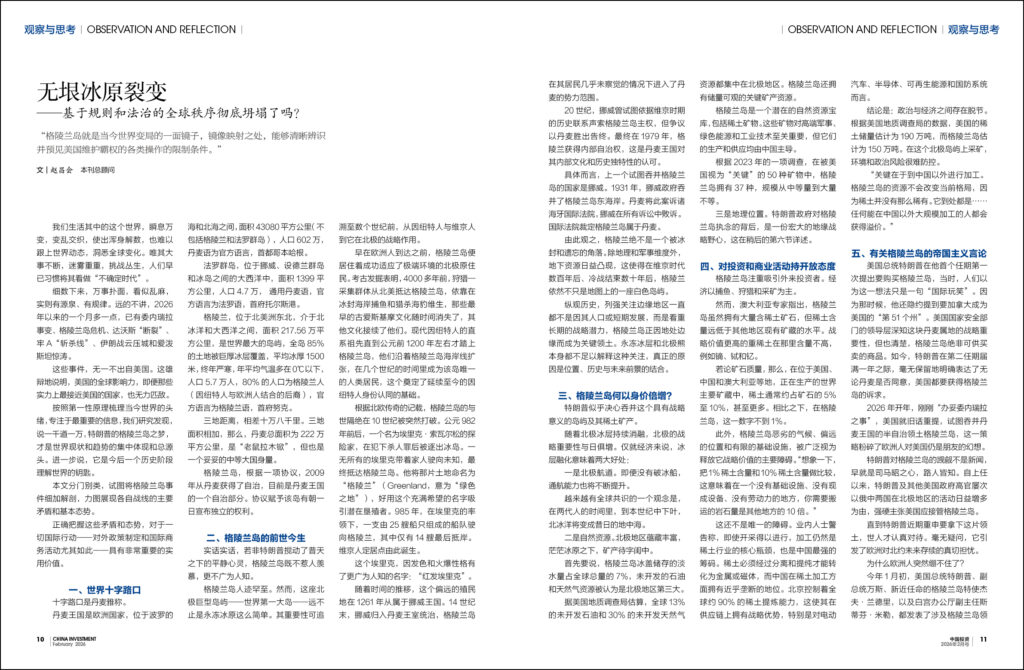
文|赵昌会 本刊总顾问
导读
●一、世界十字路口
●二、格陵兰岛的前世今生
●三、格陵兰岛何以身价倍增?
●四、对投资和商业活动持开放态度
●五、有关格陵兰岛的帝国主义言论
●六、对吞并的痴迷
●七、地主之见
●八、格陵兰岛终将是美国盘中餐
● 九、俄罗斯和中国的位置
● 十、“旧秩序一去不返”
● 十一、建言
我们生活其中的这个世界,瞬息万变,变乱交织,使出浑身解数,也难以跟上世界动态,洞悉全球变化。唯其大事不断,迷雾重重,挑战丛生,人们早已习惯将其看做“不确定时代”。
细数下来,万事扑面,看似乱麻,实则有源泉、有规律。远的不讲,2026年以来的一个月多一点,已有委内瑞拉事变、格陵兰岛危机、达沃斯“断裂”、牢A“斩杀线”、伊朗战云压城和爱泼斯坦惊涛。
这些事件,无一不出自美国。这雄辩地说明,美国的全球影响力,即便那些实力上最接近美国的国家,也无力匹敌。
按照第一性原理梳理当今世界的头绪,专注于最重要的信息,我们研究发现,说一千道一万,特朗普的格陵兰岛之梦,才是世界现状和趋势的集中体现和总源头。进一步说,它是今后一个历史阶段理解世界的钥匙。
本文分门别类,试图将格陵兰岛事件细加解剖,力图展现各自战线的主要矛盾和基本态势。
正确把握这些矛盾和态势,对于一切国际行动——对外政策制定和国际商务活动尤其如此——具有非常重要的实用价值。
一、世界十字路口
十字路口是丹麦雅称。
丹麦王国是欧洲国家,位于波罗的海和北海之间,面积43080平方公里(不包括格陵兰和法罗群岛),人口602万,丹麦语为官方语言,首都哥本哈根。
法罗群岛,位于挪威、设德兰群岛和冰岛之间的大西洋中,面积1399平方公里,人口4.7万, 通用丹麦语,官方语言为法罗语,首府托尔斯港。
格陵兰,位于北美洲东北,介于北冰洋和大西洋之间,面积217.56万平方公里,是世界最大的岛屿,全岛85%的土地被巨厚冰层覆盖,平均冰厚1500米,终年严寒,年平均气温多在0℃以下,人口5.7万人,80%的人口为格陵兰人(因纽特人与欧洲人结合的后裔),官方语言为格陵兰语,首府努克。
三地距离,相差十万八千里。三地面积相加,那么,丹麦总面积为222万平方公里,是“老鼠拉木锨”,但也是一个妥妥的中等大国身量。
格陵兰岛,根据一项协议,2009年从丹麦获得了自治,目前是丹麦王国的一个自治部分。协议赋予该岛有朝一日宣布独立的权利。
二、格陵兰岛的前世今生
实话实说,若非特朗普搅动了普天之下的平静心灵,格陵兰岛既不惹人羡慕,更不广为人知。
格陵兰岛人迹罕至。然而,这座北极巨型岛屿——世界第一大岛——远不止是永冻冰原这么简单。其重要性可追溯至数个世纪前,从因纽特人与维京人到它在北极的战略作用。
早在欧洲人到达之前,格陵兰岛便居住着成功适应了极端环境的北极原住民。考古发掘表明,4000多年前,狩猎—采集群体从北美抵达格陵兰岛,依靠在冰封海岸捕鱼和猎杀海豹维生,那些最早的古爱斯基摩文化随时间消失了,其他文化接续了他们。现代因纽特人的直系祖先直到公元前1200年左右才踏上格陵兰岛,他们沿着格陵兰岛海岸线扩张,在几个世纪的时间里成为该岛唯一的人类居民,这个奠定了延续至今的因纽特人身份认同的基础。
根据北欧传奇的记载,格陵兰岛的与世隔绝在10世纪被突然打破。公元982年前后,一个名为埃里克·索瓦尔松的探险家,在犯下杀人罪后被逐出冰岛。一无所有的埃里克带着家人驶向未知,最终抵达格陵兰岛。他将那片土地命名为“格陵兰”(Greenland,意为“绿色之地”),好用这个充满希望的名字吸引潜在垦殖者。985年,在埃里克的率领下,一支由25艘船只组成的船队驶向格陵兰,其中仅有14艘最后抵岸。维京人定居点由此诞生。
这个埃里克,因发色和火爆性格有了更广为人知的名字:“红发埃里克”。
随着时间的推移,这个偏远的殖民地在1261年从属于挪威王国。14世纪末,挪威归入丹麦王室统治,格陵兰岛在其居民几乎未察觉的情况下进入了丹麦的势力范围。
20世纪,挪威曾试图依据维京时期的历史联系声索格陵兰岛主权,但争议以丹麦胜出告终。最终在1979年,格陵兰获得内部自治权,这是丹麦王国对其内部文化和历史独特性的认可。
具体而言,上一个试图吞并格陵兰岛的国家是挪威。1931年,挪威政府吞并了格陵兰岛东海岸。丹麦将此案诉诸海牙国际法院,挪威在所有诉讼中败诉。国际法院裁定格陵兰岛属于丹麦。
由此观之,格陵兰绝不是一个被冰封和遗忘的角落。除地理和军事维度外,地下资源日益凸现,这使得在维京时代数百年后、冷战结束数十年后,格陵兰依然不只是地图上的一座白色岛屿。
纵观历史,列强关注边缘地区一直都不是因其人口或短期发展,而是看重长期的战略潜力,格陵兰岛正因地处边缘而成为关键领土。永冻冰层和北极熊本身都不足以解释这种关注,真正的原因是位置、历史与未来前景的结合。
三、格陵兰岛何以身价倍增?
特朗普似乎决心吞并这个具有战略意义的岛屿及其稀土矿产。
随着北极冰层持续消融,北极的战略重要性与日俱增。仅就经济来说,冰层融化意味着两大好处:
一是北极航道。即便没有破冰船,通航能力也将不断提升。
越来越有全球共识的一个观念是,在两代人的时间里,到本世纪中下叶,北冰洋将变成昔日的地中海。
二是自然资源。北极地区蕴藏丰富,茫茫冰原之下,矿产待字闺中。
首先要说,格陵兰岛冰盖储存的淡水量占全球总量的7%,未开发的石油和天然气资源被认为是北极地区第三大。
据美国地质调查局估算,全球13%的未开发石油和30%的未开发天然气资源都集中在北极地区。格陵兰岛还拥有储量可观的关键矿产资源。
格陵兰岛是一个潜在的自然资源宝库,包括稀土矿物。这些矿物对高端军事、绿色能源和工业技术至关重要,但它们的生产和供应均由中国主导。
根据2023年的一项调查,在被美国视为“关键”的50种矿物中,格陵兰岛拥有37种,规模从中等量到大量不等。
三是地理位置。特朗普政府对格陵兰岛执念的背后,是一份宏大的地缘战略野心,这在稍后的第六节详述。
四、对投资和商业活动持开放态度
格陵兰岛注重吸引外来投资者。经济以捕鱼、狩猎和采矿为主。
然而,澳大利亚专家指出,格陵兰岛虽然拥有大量含稀土矿石,但稀土含量远低于其他地区现有矿藏的水平。战略价值更高的重稀土在那里含量不高,例如镝、铽和钇。
若论矿石质量,那么,在位于美国、中国和澳大利亚等地,正在生产的世界主要矿藏中,稀土通常约占矿石的5%至10%,甚至更多。相比之下,在格陵兰岛,这一数字不到1%。
此外,格陵兰岛恶劣的气候、偏远的位置和有限的基础设施,被广泛视为释放它战略价值的主要障碍。“想象一下,把1%稀土含量和10%稀土含量做比较,这意味着在一个没有基础设施、没有现成设备、没有劳动力的地方,你需要搬运的岩石量是其他地方的10倍。”
这还不是唯一的障碍。业内人士警告称,即使开采得以进行,加工仍然是稀土行业的核心瓶颈,也是中国最强的筹码。稀土必须经过分离和提纯才能转化为金属或磁体,而中国在稀土加工方面拥有近乎垄断的地位。北京控制着全球约90%的稀土提炼能力,这使其在供应链上拥有战略优势,特别是对电动汽车、半导体、可再生能源和国防系统而言。
结论是:政治与经济之间存在脱节。根据美国地质调查局的数据,美国的稀土储量估计为190万吨,而格陵兰岛估计为150万吨。在这个北极岛屿上采矿,环境和政治风险很难防控。
“关键在于到中国以外进行加工。格陵兰岛的资源不会改变当前格局,因为稀土并没有那么稀有。它到处都是……任何能在中国以外大规模加工的人都会获得溢价。”
五、有关格陵兰岛的帝国主义言论
美国总统特朗普在他首个任期第一次提出要购买格陵兰岛,当时,人们以为这一想法只是一句“国际玩笑”。因为那时候,他还隐约提到要加拿大成为美国的“第51个州”。美国国家安全部门的领导层深知这块丹麦属地的战略重要性,但也清楚,格陵兰岛绝非可供买卖的商品。如今,特朗普在第二任期届满一年之际,毫无保留地明确表达了无论丹麦是否同意,美国都要获得格陵兰岛的诉求。
2026年开年,刚刚“办妥委内瑞拉之事”,美国就旧话重提,试图吞并丹麦王国的半自治领土格陵兰岛,这一策略粉碎了欧洲人对美国仍是朋友的幻想。
特朗普对格陵兰岛的觊觎不是新闻,早就是司马昭之心,路人皆知。自上任以来,特朗普及其他美国政府高官屡次以俄中两国在北极地区的活动日益增多为由,强硬主张美国应接管格陵兰岛。
直到特朗普近期重申要拿下这片领土,世人才认真对待。毫无疑问,它引发了欧洲对北约未来存续的真切担忧。
为什么欧洲人突然绷不住了?
今年1月初,美国总统特朗普、副总统万斯、新近任命的格陵兰岛特使杰夫·兰德里,以及白宫办公厅副主任斯蒂芬·米勒,都发表了涉及格陵兰岛领土的挑衅性言论。美国高级官员声称,对抗俄罗斯和中国,在战时控制通道,扩大美国海军的存在,这些都是合理的安全关切。他们完全不相信格陵兰岛人或丹麦人能够代表美国处理这些事务。
其中,特朗普的态度不容置疑,他的惊人言论遭到欧洲领导人的普遍谴责。2025年1月初,他说,“格陵兰岛是一个不可思议的地方,如果它成为我们国家的一部分,人们将受益匪浅。我们会保护它,珍惜它,让它免受外部邪恶世界的侵害。让格陵兰岛再次伟大!”
2026年1月4日,特朗普坚称,出于国家安全的考虑,他想要格陵兰岛。“为了国家安全和全球自由,美利坚合众国认为,(得到)格陵兰岛的所有权和控制权是绝对必要的。”
“你看一看地图。我是房地产开发商。”特朗普对《纽约时报》记者彼得·贝克说,“我喜欢地图。我总是说:看看它有多大,它真是大。它就应该是美国的一部分。”他直截了当,“我不需要国际法”。
1月4日,特朗普再次称这一丹麦领土“被俄罗斯和中国船只包围”。“你看看格陵兰岛,你沿着海岸线看一看,到处都是俄罗斯和中国船只……我们必须拥有它。”
米勒1月5日在接受有线新闻网(CNN)采访时,他的话更加出彩,堪称金句:“我们生活在一个由实力、武力和权力主宰的世界中。自古以来,这就是世界的铁律。”
兰德里原为路易斯安那州州长,2025年12月,特朗普任命他为美国格陵兰岛特使。兰德里在宣布自己的新职务时。在社交平台X上写道:“我很荣幸能以志愿者的身份为你们服务,让格陵兰岛成为美国的一部分。”
兰德里在海湖庄园对记者说:“我们需要格陵兰岛是为了国家安全,不是为了矿产。”
六、对吞并的痴迷
特朗普执意接管格陵兰岛,或许有政治、外交、军事和地缘战略方面的理由。许多格陵兰人深表怀疑,难道美国要建立一个北极帝国?
自1867年以来,美国历届政府都曾有过类似的想法。今天最显眼的是,美国仅保留着位于格陵兰岛西北部的皮图菲克太空基地(Pituffik Space Base,旧称图勒空军基地),其任务包括太空监测、导弹袭击预警以及美国防御卫星的控制。这个太空基地驻有650人,其中只有200人是美国军人,其余人员是在基地生活和工作的加拿大、丹麦和格陵兰岛平民。
综合美欧媒体报道,一般认为下述原因是特朗普的主要动力:
其一,确保格陵兰岛的安全。
部分原因可以追溯到冷战时期,当时格陵兰岛是追踪飞越北极导弹的理想地点,也是监测从北方港口出发的俄罗斯船只的监控链的一部分。
美国在格陵兰岛加强军事存在具有历史依据。冷战期间,美国曾在格陵兰岛驻扎数千名士兵,设有众多军事基地,并配备拥有核打击能力的远程轰炸机。
而实际上,如今美国在格陵兰岛的驻军规模大幅缩减,仅有约200名士兵执行弹道导弹预警任务。
其二,控制航道。
格陵兰岛目前的重要性还体现在北极地区的战略竞争中监控新的贸易路线。
其三,宏大的地缘战略地区。
恰如澳大利亚“珍珠与刺激”网站1月27日文章所言,原因在于,格陵兰岛地处两大演变迅速的前沿领域的交汇点:一是因气温上升而航线重塑的北极地区,二是日趋军事化的外层空间。其中居于核心位置的皮图菲克太空基地,在从导弹监测到气候追踪等各项工作中都将发挥关键作用。
其四,北极发射枢纽的潜力。
如今地表空间与太空轨道不再被视为全球公域,而是需要争夺和守护的战略资源。皮图菲克太空基地是监视太空活动最理想的重要资产。在太空轨道成为新的制高点的时代,这种视野堪称无价之宝。鉴于全球发射能力日益受到可用场地减少与准入限制的制约,格陵兰岛骤然成为“黄金资产”。
当年,阿拉斯加被视为一块冰雪覆盖的“无用之地”,而今,它的价值翻了亿万倍。谁能否认,格陵兰岛未必不是阿拉斯加第二呢!
其五,开疆拓土之君,重振帝国主义。
特朗普将格陵兰岛视为西半球的一部分,而西半球在新版美国《国家安全战略》(2025年12月4日发布)和《国防战略》(2026年1月23日发布)中,被列为他执政期间最重要的外部安全关切。
关键在于,欧洲高级官员的共识是,特朗普的所有安全目标都可以轻易实现。没有人反对美国在岛上建更多基地,美国和丹麦的双边安排早为安全和防务合作提供了基础,且自1951年以来,美国已在该岛享有大量军事通道和基地运营权。
此前,1941年,丹麦驻华盛顿大使亨里克·考夫曼曾授予美国在格陵兰岛的相关权利,这一举措实际上使该岛的主权在哥本哈根与华盛顿之间被一分为二——美国掌握安全事务主权,丹麦则负责内部事务,这一局面随后通过1951年签署的防务协定得以正式确立并长期延续。
格陵兰岛自治政府总理延斯-弗雷德里克·尼尔森2025年12月下旬就曾明确表示:“只要美国有意在格陵兰岛上加强北极地区安全保障,绝对不会受到任何阻碍。”根据丹麦和美国1951年签署的防务协定,除现有的皮图菲克基地外,美国有权在格陵兰岛任何地方新建军事基地。尤其是,迫于美国的压力,格陵兰岛自治政府已采取措施阻止中国在当地投资。
不仅如此,就在2025年,丹麦议会通过一项法案,允许美军在丹麦本土建立军事基地,但丹麦政府已明确表态,如果特朗普执意吞并格陵兰岛的全部或部分领土,丹麦将终止这一协议
七、地主之见
格陵兰岛没有自己的军队,负责保卫该岛的丹麦部署到那里执行保卫任务的海空力量有限。
那里还有一个丹麦军事基地,位于努克的北极联合司令部,驻扎了约130名官兵。
格陵兰岛的主要防卫来源是一个美军基地,就是皮图菲克,驻扎了大约150名美国军人,大多是空军和太空军,以及一个洲际弹道导弹早期侦测系统。
据德国《每日镜报》网站1月6日报道,自从特朗普2025年初提到此事以来,五角大楼几乎肯定已经制定了包含多种吞并格陵兰岛方案的应急计划。中央情报局的一个小组显然已经部署在格陵兰岛,“这让人想起委内瑞拉的情况”,美国特种部队是否也会部署到格陵兰岛?
军事行动将是最后的手段。该岛甚至可能一枪不放就被占领,因为驻扎在皮图菲克太空基地的美国军人只需要穿过马路进入格陵兰岛政府大厦。
2026年1月9日,格陵兰岛的5家政党发布联合声明,明确拒绝了特朗普为美国获得该岛而日益咄咄逼人的企图。
5家政党领导人反对特朗普的言论,“我们想再次强调,我们希望美国停止蔑视我们国家。”他们签署的声明称:“我们不想成为美国人。我们不想成为丹麦人,我们想做格陵兰岛人。格陵兰岛的未来必须由格陵兰人决定。”
八、格陵兰岛终将是美国盘中餐
美国外交文化的基本原则是利益优先,今天的“让美国再次伟大”或“唐罗主义”则将利益第一推到了极致。说到底,特朗普之所以力克群雄,能隔任当选——通俗点说,叫“二进宫”,正是他承诺要使美国回归自然状态。
格陵兰岛是一片广袤且具有重要战略意义的大陆,面积相当于德克萨斯州和阿拉斯加州加起来那么大。对于发誓要成为美国历史上最伟大总统的特朗普来说,这太有吸引力了!真可谓天时地利,万事俱备,只欠东风——人不和。不过,依照特朗普的性格,加上美国的绝对实力,有什么能挡得住吗?
2026年是美国立国250周年。遥想当年,美国作为大国崛起,依靠的是大量攫取领土,办法多种多样:或者就地解决土著印第安人,或者从无力反抗的墨西哥豪夺,或者从俄罗斯、西班牙、丹麦等国购买。当然,也包括直接到海外占领或变相殖民,或通过战争收入囊中。
美国在购买土地方面有着悠久的历史。比如,1867年购买阿拉斯加州,1917年从丹麦手中收购美属维尔京群岛——这是它上次购买土地。100多年后,又是丹麦!
2019年,《华盛顿邮报》估计,假设格陵兰岛待售,其售价可能高达1.7万亿美元。对此,格陵兰岛自治政府总理拒绝了迄今为止的所有提议,“我们不可售,以后也不可售。”
哥本哈根大学政治学教授米克尔·拉斯穆森在接受法国《快报》周刊2026年1月9日的一篇访谈录中说,迄今为止,哥本哈根既未能遏制格陵兰岛的独立势头,也无力约束格陵兰岛政府在对华合作方面日益膨胀的野心。
拉斯穆森教授坚信,从战略角度来看,对丹麦而言,波罗的海的安全为优先级,要高于格陵兰岛的安全。
换句话说,经过一再拉扯,丹麦会倾向于放手,“格陵兰岛迟早会脱离丹麦”。
拉斯穆森教授还说,但这不算是向美国的施压及其帝国野心妥协。
现实背后的真相是,一个地位弱小,只能动嘴,一个铁心要拿,势在必得。对美国而言,格陵兰岛这块百年不遇的肥肉,横竖都会进美国的嘴,不是“会否”的问题,而是“何时”的问题。试想,特朗普既然不惜开罪一众盟友,丹麦怎可抵得住美国的万钧之力?
九、俄罗斯和中国的位置
俄罗斯和中国在北极地区的活动越来越多,这一点无须自谦。
铺天盖地的媒体报道,一方面将特朗普对格陵兰岛的野心投射到聚光灯下。但另一方面,它们强调了西方集团与中国和俄罗斯的北极安全竞争,以及因冰雪融化而开通的战略航线。
从俄罗斯利益的角度来说,当前局势并未构成潜在威胁。俄罗斯长期以来一直重视对北极的投入,在该地区设有12座军事基地和16个深水港。此外,俄罗斯是全球唯一拥有核动力破冰船的国家,目前有一支拥有8艘核动力破冰船的船队,并且计划进一步扩充船队数量。
中国目前拥有3艘破冰船,能够在北极地区开展军民两用的科研活动。中国也持续加大对北极地区的投入,正与俄罗斯合作研发可全年航行于北极航道的集装箱船。
格陵兰岛落入美国之手,中国大可淡然处之。中国网络空间甚为主流的看法是北极航道受控。看地图可一目了然,中国船舶是从白令海峡进入北冰洋,最后南下,停靠欧洲港口,与格陵兰岛关系不大。因为它并没直接威胁到北极航道,而中国主要从贸易角度关心这条航道。与此同时,美国在该岛的军事存在与中国的安全利益没有构成显性关联。正如俄罗斯知名作家、瓦尔代国际辩论俱乐部项目负责人季莫费·博尔达乔夫1月13日在俄罗斯《观点报》网站文章所言,“中国甚至带着好奇,坐观美国如何摧毁自己的帝国根基。”
至于要应对虚幻的中俄威胁,特朗普本人和举世民众恐怕无人相信。美国总统关于所谓格陵兰岛受到中国和俄罗斯军事存在威胁,而该岛毫无防御之力的言论,无人当真。
对美国而言,获取北极资源、控制航道、制衡中俄两国,都是合理的战略目标。然而,夺取格陵兰岛的做法,对实现这些目标并没有太大帮助,相反,特朗普的反复表态,正在损害美国与北约关键盟友丹麦的关系,同时也破坏了美国与格陵兰岛本身的关系。
十、“旧秩序一去不返”
在今年刚刚结束的达沃斯论坛上,加拿大总理马克·卡尼一下子举世瞩目,成了最佳讲演者。他斩钉截铁地宣布,世界秩序已经“断裂”,而“旧秩序一去不返”。
特朗普的执政风格是遇魔杀魔,他十分不屑于世人颇有微词的所谓“双重标准”。表现在语言风格上,他怎么想就怎么说,怎么痛快就怎么说,可以称之为襟怀坦白。听者难受,也得受着。有充分理由认为,在世界政治领导人中,他是一个难得一见的标本式大人物。
但这是有代价的。在格陵兰岛问题上,他令人震惊也耳目一新的言论所带来的冲击,伤到敌人,也乱了自己。后者主要是指美国核心利益、国内外政策的失衡、美国耗费数十年苦心建立的信任与信誉、美国的西方领导地位以及北约盟国和其他附属国的忠诚。
特朗普决心从丹麦手中夺取格陵兰岛,破坏了大西洋联盟,令“北约已名存实亡”。没有欧洲人能再指望美国了。
对欧洲人来说,美国现在是一个掠夺性政权。他们现在面对的是一个全新的美国——不再是1945年以来他们所面对的那个美国。即使最终是用美元而不是导弹轰炸而得手,对欧洲人来说也是一种羞辱。
许多欧洲领导人担心,他们在化解这场危机方面几乎无能为力,因为一个更为粗暴和险恶的目标在起作用:领土扩张和房地产开发。特朗普似乎是受扩大美国版图的愿望所驱使。
这个目标可能不会通过地面部队来实现,而是通过政治和经济胁迫来直接影响5.7万格陵兰人;或者通过全民公决,这样美国就可以宣称对格陵兰岛拥有民事主权,而不仅是军事主权。
1月17日,特朗普威胁要对8个胆敢向格陵兰岛派兵的欧洲国家加征10%的关税,自2月1日起,税率到6月可能升至25%。后来,他又撤销了这个威胁,但后果很严重。
被特朗普点名的8国,丹麦、芬兰、法国、德国、荷兰、挪威、瑞典和英国,希望保障北极地区安全,同时回应特朗普,就关税螺旋发出警告。
但在实践层面,特朗普的决定可能行不通。美国计划只制裁8国,但欧盟所有成员国均共享自由贸易协定,这意味着它们可通过未受制裁的国家出口本国产品,从而使关税威胁失效。
法国总统马克龙就直言不讳地说,“关税威胁是不可接受的。”欧盟委员会主席冯德莱恩和欧洲理事会主席科斯塔也说,这些关税“将损害跨大西洋关系,并有可能引发危险的恶性循环”,造成“危险的关税螺旋”。
最新的进展是,欧盟准备启动反制措施,开始讨论所谓的“贸易重炮”,即《反胁迫工具法》(Anti-Coercion Instrument, ACI),允许启动针对美国科技企业的制裁。
欧洲议员表示,最简单的应对方式是贸易反制,即暂停落实《特恩贝里协议》(Turnberry Agreement)。这份贸易协议是欧盟2025年7月27日与美国签署的,协议中欧盟同意接受美方15%的关税,且不采取报复措施。
只可惜,欧洲人没这个胆量,他们斗不过特朗普。
如果美国强行夺取北约盟友丹麦对这片领土的控制权,那将危及北约未来的存续。北约的核心原则只有一条:攻击某个成员国即攻击全体。正是持此尚方宝剑,丹麦首相梅特·弗雷泽里克森于1月9日强硬表示,美国军事控制格陵兰岛意味着北约的终结。
北约即将迎来它的77岁生日。到2026年4月,这个跨大西洋安全联盟已届77周年。它原本是为对抗苏联等国,于1949年4月4日签署军事联盟条约,同年8月24日生效,缔约国实行“集体自卫”,始终是西方安全战略的支柱。北约被西方集团经常吹嘘为“历史上最成功的多边机构”,实为美国对西方国家控制及保障世界霸权的军事工具。
在一个日益危险的世界里,特朗普的夺取之梦,在一系列选择之后,动用美国军队的可能性微乎其微,但“始终是一个选项”。
十一、建言
以上,通过我们浩繁的条分缕析可见,格陵兰岛就是当今世界变局的一面镜子,镜像映射之处,能够清晰辨识并预见美国维护霸权的各类操作的限制条件。
当下的口头禅是,我们生活在一个不可预测的世界里。
且慢!以国家风险视角看世界,可以号准特朗普的脉搏,帷幄知天下。

